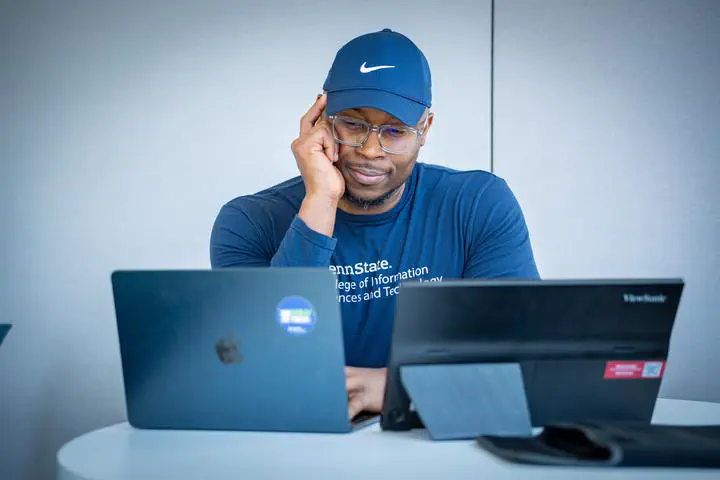Penn State connections lead doctoral student to interdisciplinary College of IST
 Jason Lucas is pursuing a doctoral degree in informatics from the Penn State College of Information Sciences and Technology. Credit: Cole Handerhan / Penn State
Jason Lucas is pursuing a doctoral degree in informatics from the Penn State College of Information Sciences and Technology. Credit: Cole Handerhan / Penn StateAbstract
Jason Lucas’s path to Penn State’s College of Information Sciences and Technology exemplifies how interdisciplinary education and strong mentorship can shape a researcher’s trajectory. From his undergraduate studies in information technology at St. George’s University in Grenada to his current doctoral work in informatics, Lucas has deliberately built expertise across multiple domains. His journey through health informatics at Boston University and public health back at SGU created an unconscious multidisciplinary foundation that now drives his research in multilingual natural language processing. With support from the LinDiV fellowship and the PIKE Research Group, Lucas is developing inclusive language technologies to protect vulnerable communities from harmful content across languages with limited digital resources.
Academic Journey
This feature story traces the interdisciplinary path that led Jason Lucas from the West Indies to Penn State’s College of Information Sciences and Technology, where he’s pursuing groundbreaking research in multilingual AI and harmful content detection.
Key Highlights
Multidisciplinary Foundation
- Information Technology: Bachelor’s degree at St. George’s University in Grenada, West Indies
- Health Informatics: Master’s in computer information systems at Boston University
- Public Health: Master of public health back at St. George’s University
- Current Focus: Doctoral degree in informatics at Penn State’s College of IST
Mentorship Network
- Theodore Hollis: Professor emeritus from Penn State’s Eberly College of Science, mentor at SGU
- Dongwon Lee: Professor and director of doctoral programs, current graduate adviser
- LinDiV Program: Transdisciplinary fellowship enhancing linguistic knowledge
- PIKE Research Group: Collaborative environment for data mining and security applications
Research Evolution
- Perfect alignment: Informatics field matching his interdisciplinary background
- AI and NLP solutions: Addressing societal challenges in healthcare and information integrity
- Multilingual focus: Developing technologies for languages with limited digital resources
- Social impact: Protecting vulnerable communities from manipulation and harmful content
Current Research Impact
PIKE Research Group
Lucas works within the Penn State Information Knowledge and Web (PIKE) Research Group, studying data management and mining across diverse forms with focus on social and security applications.
Research Goals
“Success in my work would look like advancing research for social good and developing deployable technologies that protect vulnerable populations from manipulation and harmful content. My ultimate goal is to further the development of inclusive language technology that not only bridges the digital language divide but also protects people from hidden manipulations that exploit psychosocial biases.”
LinDiV Fellowship Impact
- Filling gaps: Providing depth in linguistics and language sciences
- Transdisciplinary approach: Combining computational methods with linguistic theory
- Community building: Connecting with researchers across disciplines
- Research enhancement: Strengthening multilingual NLP capabilities
Looking Forward
Lawrence Livermore National Laboratory Opportunity
Lucas is preparing for the Data Science Summer Institute at LLNL, where he will:
- Apply research: Work on projects of national importance
- Collaborate: Partner with leading scientists and engineers
- Bridge academia: Connect academic research with practical applications
- Gain experience: Access high-performance computing resources
Vision for Impact
Lucas aims to develop inclusive language technologies that can detect and counter harmful content across multiple languages, with particular relevance for defending communities whose languages aren’t prioritized by major tech platforms.
The Power of Interdisciplinary Education
“Throughout this journey, I was unconsciously building a multidisciplinary background that would later become my greatest strength. Learning directly from leading clinicians, public health professionals and technology experts across these institutions gave me a unique perspective on solving complex problems at the intersection of these fields.”
Lucas’s story demonstrates how diverse educational experiences, combined with strong mentorship, can create researchers uniquely positioned to tackle complex, real-world challenges.
Read the complete story to learn more about Jason Lucas’s academic journey and his vision for developing inclusive language technologies that protect vulnerable communities worldwide.